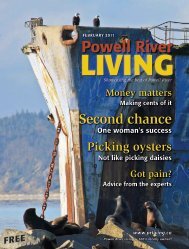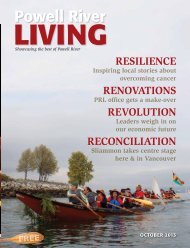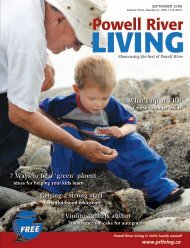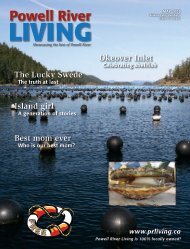difference
To Shop For - Powell River Living
To Shop For - Powell River Living
- No tags were found...
You also want an ePaper? Increase the reach of your titles
YUMPU automatically turns print PDFs into web optimized ePapers that Google loves.
The dry end of Paper Machine #11<br />
Catalyst looks ahead<br />
Powell River: The mill that could and did<br />
by Isabelle Southcott<br />
For the past 10 years, a dark cloud loomed<br />
over the Catalyst Powell River mill. Layoffs,<br />
tax cuts, a reduced work week, early retirements,<br />
and everything else associated with<br />
weak markets, a recession and downsizing<br />
has plagued the mill that was once the largest<br />
newsprint producer west of Ontario.<br />
But now, for the first time in over a decade,<br />
that dark cloud has dissipated and the future<br />
looks brighter, says Stew Gibson, former Powell<br />
River mill manager.<br />
The mill is recovering and management is<br />
cautiously optimistic, says Gibson. He’s sitting<br />
in the boardroom of the Powell River mill with<br />
Mike Verdiel, Communications, Energy and<br />
Paperworkers Union Local 76 president. The<br />
two had to work closely together to keep the<br />
mill viable. Powell River would certainly have<br />
followed the demise of other mills without the<br />
cooperation of Locals 76 and 1 of the Communications,<br />
Energy and Paperworkers Union.<br />
Both the company and the unions also say<br />
the cooperation of the City of Powell River has<br />
made the mill’s survival possible.<br />
Catalyst Paper, a leading mechanical papers<br />
producer in North America, owns a mill<br />
in Arizona and three in BC. The Crofton and<br />
Port Alberni mills continue to operate, but the<br />
mill in Campbell River closed permanently in<br />
2010. So did the recycling operation in Coquitlam.<br />
Both were victims of the worst economic<br />
downturn in the industry, and a difficult<br />
labor and tax situation.<br />
The fact that the Powell River mill survived<br />
the worst economic downturn in the industry<br />
can be summed up in two words: cooperation<br />
and diversification. First there was cooperation<br />
between mill management, the unions, and<br />
staff. Then the taxpayers of Powell River and<br />
the City made adjustments to ensure the viability<br />
of the mill. Without this willingness to<br />
change and move forward, the mill could not<br />
have survived.<br />
AGREEMENTS REACHED<br />
At the same time, the mill was examined<br />
for areas to reduce costs. Although Local 76’s<br />
labour contract didn’t expire until April 2003,<br />
a new agreement was reached early at the request<br />
of the company. “It gave people some<br />
breathing room and brought about relative<br />
labour peace,” says Verdiel. In an attempt to<br />
cut costs and save jobs, members of Local 76<br />
agreed to a reduced workweek of 37 1 ⁄3 hours.<br />
Communications improved at the mill.<br />
“Grievances dropped from 110 a year to three<br />
a year,” says Verdiel. For the first time ever,<br />
the heads of the mill’s two unions were invited<br />
to be part of meetings and discussions with<br />
the municipality.<br />
“Labour was willing to make changes to ensure<br />
the viability of the mill,” says Gibson.<br />
Some took early retirement, others were laid<br />
off. The collective agreement was modified<br />
and efficiencies were gained on the paper machines,<br />
said Gary Jackson, Local 1’s second<br />
vice-president.<br />
As Jackson points out,“It was survival mode<br />
and everybody stepped up. We knew we were<br />
going through some tough times and that we<br />
had to work with what we had.”<br />
Because of the efforts made by the City and<br />
mill employees, Powell River’s was the only<br />
mill in the Catalyst group that did not take<br />
downtime in 2009.<br />
As a result, the Powell River mill produced<br />
480,000 tonnes of paper and, directly and indirectly,<br />
supported more than 1,100 jobs.<br />
RouGH DECADE<br />
The first 10 years of 2000 haven’t been easy<br />
and both Gibson and Verdiel are glad they are<br />
behind them.<br />
In October 2001, Norske purchased the<br />
Powell River mill from Pacifica Papers. In late<br />
November of the same year Norske closed the<br />
kraft mill as it was not economically viable.<br />
Sponsored Article<br />
Powell River Living • april 2011 • 15

















